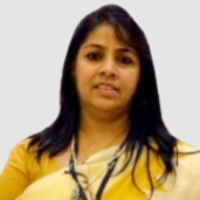Meet the woman whose organization is helping survivors of Cyclone Fani regain their livelihoods, and see how the Facebook crisis donate button has connected them to donors all over the world.

When Cyclone Fani hit eastern India and Bangladesh in 2019, millions of individuals were forced to evacuate their homes to flee the destruction caused by the strong winds and torrential rains. The 10 million individuals in the five coastal districts of Odisha were the most affected, with many left homeless or without livelihoods. One nonprofit organization, Aaina, has been working to change that. With the help of GlobalGiving and the Facebook crisis donate button, the organization was able to provide life-saving support to the most vulnerable survivors of Cyclone Fani.
This is how. When money is donated through the crisis donate button on Facebook’s website, GlobalGiving ensures those funds reach the organizations that are already working on the ground to bring solutions to their communities. This was exactly what happened earlier this year. GlobalGiving was able to send that money safely to Aaina to provide more than 4,200 families with food, sanitation kits, psychosocial support, and more.
Here’s what the organization’s founder, Sneha Mishra, has to say about her experience on the ground and her plans to build resilience moving forward.
A: During our operation in Brahmagiri following Cyclone Fani, we came across many cases that still continue to haunt us, but also highlight the importance of our mission.
For example, 15-year-old Pratibha from Puri district in Raipur is a bright student who aims to become a doctor. During the Cyclone, Pratibha and her family had to move into the local cyclone shelter. When she was finally able to go back to her house, she was in shock. The rooftop was missing, as well as all her clothes and books.
After hearing of all she had been through, Aaina responded with immediate relief. We provided her family with essential household and sanitation kits, and are now providing psychosocial therapy to Pratibha and many of her fellow friends. We also provided her with an educational kit to enable her to continue following her dream of becoming a doctor!
A: Cyclone Fani resulted in widespread devastation—destroying people’s houses, farms, boats, ponds, and community spaces. Apart from financial and livelihood losses, people were also affected by a more discreet but even greater form of suffering—that is, psychological trauma.
All over the world, there is a tendency to rate a disaster on the basis of the loss of human life. But this often undermines the ongoing suffering of people who have survived the disaster.
Soon after the 1999 Super Cyclone Odisha, the government began investing significantly on disaster preparedness. This resulted in massive evacuations before Cyclone Fani, which saved people’s lives, but many still suffered the devastating loss of their homes, property, crops, and hard-earned savings. The damage assessment revealed that 50-55% of the houses in the cyclone-affected-area were damaged, and nearly 35% of houses were completely demolished. People had to wait for the government to complete assessments before getting their houses repaired or rebuilt. Since there was just one month between Cyclone Fani and the monsoon that followed shortly, there was little time to rebuild.
There was almost 90% crop loss as it was the start of the harvesting season and many people had not yet harvested their crops, causing severe food shortages and loss of livelihoods. The problem was further exacerbated by the fact that many people couldn’t go out into the workforce in the absence of a proper shelter for their families. They wanted to rebuild their houses but did not have the resources to do so. This led to women, children, and the elderly being the most vulnerable populations following this disaster.
A: Having a housing scheme with homes built according to disaster risk reduction measures is the greatest long term need. Odisha is a disaster-prone state and has only become more vulnerable due to climate change. We can improve safety and security for people as well as their property by making the living structures more disaster resilient. For people who have already lost their homes or whose houses had significant damage, these updates will decrease the time it takes for them to recover and resume a normal lifestyle post-disaster. Moreover, education will not be interrupted as community structures like schools will not be crowded by people searching for shelter.
A: Our community is resilient. Odisha has earned a global reputation for disaster preparedness. We reduced the loss of human life from 10,000 individuals during the 1999 Super Cyclone Odisha down to 65 during Cyclone Fani!
A: The funds received from GlobalGiving and Facebook contributed to the temporary shelters built for the most vulnerable families. These funds were used to provide educational kits for the children.
In the future, Sneha and Aaina volunteers will continue to work towards improving disaster resilience and holistic recovery for survivors of Cyclone Fani. Thanks to Facebook’s crisis donate button, donors from around the world are empowered to positively impact hard-to-reach communities. The continued partnership between Facebook and GlobalGiving will ensure that community-led organizations can persevere in their work to assist those who are most vulnerable.
Learn more about GlobalGiving’s Disaster Recovery Team and get connected to community-led organizations like Aaina.
Find exactly what you're looking for in our Learn Library by searching for specific words or phrases related to the content you need.